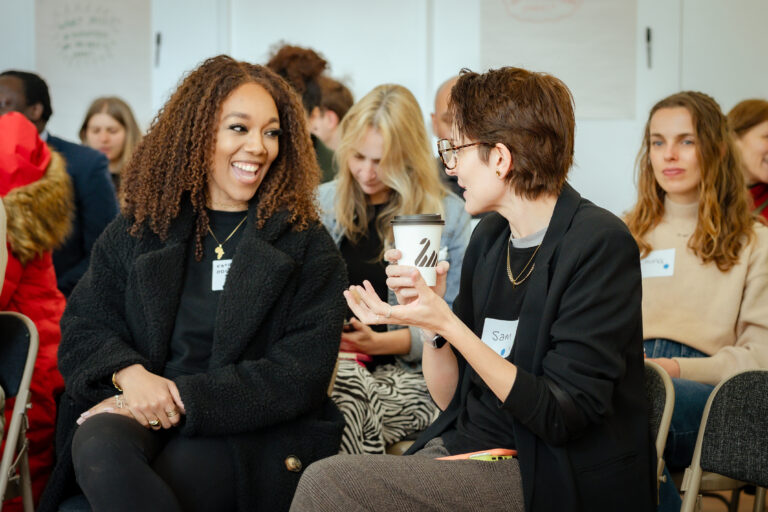Propel Learning Day: what we heard and next steps
In this blog, Katie Turner, from Propel’s learning partner – The Institute for Voluntary Action Research – shares what we learnt from our first day of bringing together organisations funded by Propel along with funders and equity partners to share and discuss their collective ambitions for the programme, alongside more informal networking.
The day was split into two parts:
- Morning: funded organisations (those in receipt of Propel grants) to discuss their collective ambitions for Propel and begin the discussion about ‘what it will take’ to support this work.
- Afternoon: funders and equity partners joined to respond to and build on the morning’s discussions.
A full summary of the Learning Day is available here.
Collective ambitions for Propel
Whilst each organisation in receipt of a Propel grant has their own individual plans for how they intend to use this funding, the following are some of the ambitions they hold in common:
- Placing lived experience ‘front and centre’ of the work. Ensuring those affected by the issues at hand are the ones informing and directing the change that needs to happen.
- Using Propel as a platform for raising awareness, engagement with, and support for issues, ‘Informing advocacy and forming a new narrative on age-old problems.’
- Space to experiment and learn. Opportunities to pilot new approaches and models and learn from them.
- Strengthening and expanding networks. Making new or strengthening existing connections with organisations that work in a similar field or geography, building peer support and identifying opportunities for partnership and collaboration.
- Building an evidence base. Making the case for the need to support certain groups; helping people understand the broader impact of the work; and exploring what’s missing in terms of available support.
What will it take to support the work and enable change?
When we asked organisations, funders and equity partners what it would take to enable change there were two key factors that came to the fore:
- A different approach to funding: the work funded through Propel will not succeed without funding and funding practices that support it. There is an opportunity through Propel for the funders to work together and build more consistent good practice. This might mean being willing to start from scratch to design new, equity-led, approaches to funding systemic change work in London. Participants looked at what’s already in place within Propel that can be built on – a vision for change; spaces for dialogue; significant investment in the sector; a focus on equity-led organisations – and what more can be done – increased flexibility and trust; open conversations about the ten-year vision for Propel; long-term grants; a consistent experience for grantees; light-touch, and co-designed reporting.
- More than a grant: identifying the ways in which Propel can support systemic change work beyond individual grants. With the first cohort of funded organisations in place, there is an opportunity to build a greater collective, in-depth understanding of the areas of work supported through Propel and explore the potential for change through collaboration. Participants again looked at what’s already in place – a multi-disciplinary, pan-London group; opportunities to network and learn; opportunities for ‘experimentation’ – and gave a number of suggestions on what else could be done: more opportunities for organisations to connect independently; targeted learning; support for wellbeing; considering who is not currently in the room and should be involved. In addition to practical measures Propel can take to support this work, there was also discussion about the behaviours it would be important to instil and maintain such as the freedom and flexibility to be disruptive and allowing for failure and spaces to discuss when things go wrong.
Next steps
The Learning Day was the first opportunity for funded organisations, funders and equity partners to come together to discuss the collective ambitions for change in the context of the Propel programme and what needs to happen to support this work.
Since then, a number of actions are underway in response to what we heard:
- Longer-term grants and grant reporting processes: A sub-group of funders and funded organisations met to discuss longer-term grants and grant reporting. They have co-designed a process for how organisations in receipt of one-year Explore grants could progress onto longer-term grants. On reporting, they discussed the idea of the majority of funders moving to a single reporting format.
- A platform to connect organisations with each other: London Funders is in the process of setting up a Slack channel to enable this.
- Review of feedback from grantees about learning activities and spaces: IVAR will use the feedback from the Learning Day and other conversations with funded organisations to inform learning activities over the next year. Alongside this, London Funders is looking at the issue of funding for engagement in learning activities (including support for independent peer groups/networking).
- Celebrating and sharing stories of change and failure: London Funders is reviewing Propel communications, looking at ways to enable partners to share failures and learning and celebrate change where it happens.

